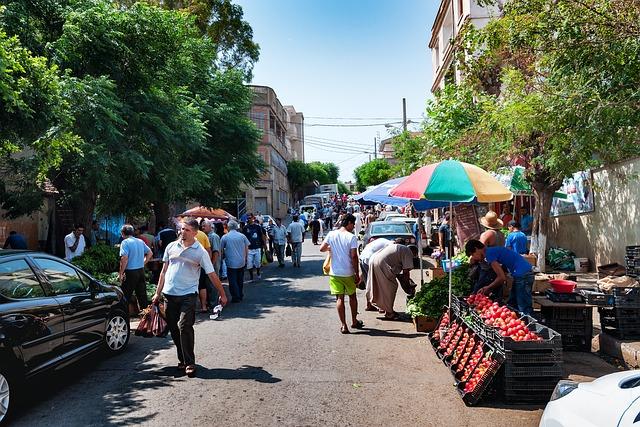In a significant development reflecting the complexities of post-colonial relations, Algeria’s parliament has advanced legislation aimed at criminalizing the glorification of French colonialism. This move comes against a backdrop of escalating diplomatic tensions with France, highlighting the lingering grievances stemming from Algeria’s brutal struggle for independence, which lasted from 1954 to 1962. The proposed law seeks to confront past injustices and assert national identity, while also reigniting debates over colonial legacy and reconciliation. As Algeria presses for acknowledgment and accountability, the implications of this legislative initiative extend beyond its borders, potentially reshaping the narrative of colonialism and the France-Algeria relationship in the 21st century.
Algerian Legislative Push: Criminalizing the Legacy of Colonialism
The Algerian government is taking decisive steps towards addressing the injustices of its colonial past by proposing legislation aimed at criminalizing actions and narratives that glorify the era of French colonialism. This legislative initiative is a direct response to the ongoing diplomatic tensions between Algeria and France, reflecting a collective desire to confront historical grievances that still resonate in contemporary political discourse.By seeking to classify the defense of colonialism as a criminal offence, Algeria aims to reassert its sovereignty and promote a narrative that prioritizes victimhood and resistance over oppression.
Key provisions of the proposed legislation include:
- Prohibition of glorifying colonial figures: Individuals found praising colonial leaders or policies may face legal repercussions.
- Education reforms: The curriculum in schools will be revised to emphasize the negative impacts of colonial rule while fostering a sense of national identity.
- Promoting historical accuracy: Historical accounts that perpetuate colonial myths will be strictly challenged in both media and educational institutions.
This initiative is not without controversy, as it raises questions regarding freedom of expression and academic discourse. Nevertheless, many supporters argue that it is a necessary step toward healing the psychological wounds inflicted by decades of colonial rule. As Algeria moves forward with this legislative push, the implications for its relationship with France remain to be seen, especially in terms of diplomatic engagements and cultural exchanges.
Diplomatic Strains: The Impact of Historical Grievances on Algerian-French Relations
The historical grievances stemming from Algeria’s colonial past have long cast a shadow over its diplomatic relations with France. Algeria’s recent move to criminalize French colonialism signifies a significant escalation in this tense relationship. Key issues fueling this rift include:
- The Legacy of Violence: The Algerian War of Independence (1954-1962) was marked by extreme brutality, with estimates of death tolls reaching up to 1.5 million Algerians. Such a legacy continues to evoke deep emotional wounds.
- The Missing and Displaced: Many families still seek closure over the disappearance of loved ones during the colonial era, which remains a sensitive topic within Algerian society.
- Skewed Narratives: Persistent disagreements over the portrayal of colonial history in school curricula exacerbate tensions, with Algeria seeking recognition and France often downplaying its colonial past.
Considering these grievances, both countries are navigating a tumultuous diplomatic landscape. Algeria’s push for *reparations* has seen increasing support domestically, and the demand for acknowledgment of historical injustices is gaining traction in international forums. Additionally, ongoing debates regarding the return of cultural artifacts looted during colonial times add a further layer of complexity to bilateral talks. As these tensions simmer,the potential for reconciliation remains contingent upon both nations’ willingness to confront and address their shared history.
Public Sentiment: The Role of National Identity in Algeria’s Colonial Narrative
In the wake of algeria’s recent move to criminalize colonialism, the role of national identity has become increasingly prominent in shaping public sentiment. Algerians find themselves at a crossroads where their historical narrative is being redefined against a backdrop of ongoing diplomatic tensions with France. The collective memory of the *Guerre d’Algérie* and the scars left by over a century of French rule continue to influence contemporary political discourse and social dynamics.Many citizens view this legislative action as a necessary assertion of national pride and a vital step towards reconciling historical injustices.
This renewed focus on national identity not only seeks to validate the experiences of past generations but also aims to foster a sense of unity among Algerians today. As society grapples with the implications of colonialism, there are key elements fueling public sentiment:
- Historical Reclamation: Efforts to recover and elevate Algeria’s indigenous history reject narratives imposed during colonial rule.
- Political Activism: Increased activism sees young Algerians advocating for a future untainted by colonial legacies.
- Cultural Renaissance: A revival of traditional arts and practices strengthens the connection to national heritage.
| Key Aspects of National Identity | Impact on Public Sentiment |
|---|---|
| Indigenous Heritage | Fosters pride and collective memory |
| Educational Reforms | Informs younger generations about colonial history |
| national Celebrations | Enhances community cohesion |
International Reactions: How Global Powers View Algeria’s Move Against Colonialism
The recent legislative move by Algeria to criminalize acts of French colonialism has captured the attention of global powers, with reactions varying significantly across political spectrums. European nations, particularly Spain and Italy, have expressed their support for Algeria’s right to reassess historical grievances, emphasizing the importance of acknowledging past injustices. In contrast, the United Kingdom and certain eastern European countries remain cautious, advocating for dialog over confrontation. France, however, has reacted defensively, indicating that such laws could exacerbate existing diplomatic tensions and hinder collaborative efforts in areas like security and economic partnership.
Meanwhile, influential voices within international organizations and advocacy groups have highlighted the symbolic importance of Algeria’s actions. Many view this as a pivotal moment in the broader movement against the legacy of colonialism globally. Notable reactions include:
- The United Nations: A call for reconciliation and historical truth-telling.
- African Union: Praise for affirming sovereignty and addressing historical wrongs.
- Human Rights Watch: Encouragement for nations to acknowledge colonial impacts and foster healing.
These developments leave room for a complex interplay of international relations, as Algeria’s stance opens up discussions on decolonization and reparatory justice, potentially inspiring other nations to confront their colonial pasts.
Legal Implications: Understanding the Framework of Proposed legislation
The proposed legislation to criminalize acts associated with French colonialism in Algeria is poised to reshape the landscape of legal accountability surrounding historical injustices. This move signals a profound shift in Algeria’s approach to its colonial past, potentially leading to far-reaching implications for governmental and individual actions. Lawmakers are expected to delineate specific parameters of the law, clarifying what constitutes an act of colonial violence or oppression, thereby setting a judicial framework through which reparations and accountability can be pursued. Additionally,the bill could also impact diplomatic relations between Algeria and France,as it could require acknowledgment of historical grievances from the French government.
As the legislation is debated, several key considerations will be addressed to ensure its effective implementation:
- Historical Context: Emphasizing the necessity to root the law within the accurate historical narrative of colonialism.
- Legal Definitions: Establishing clear definitions of terms such as “colonial acts” and “complicity” to avoid ambiguity.
- Judicial Oversight: Creating a framework for reviewing claims, ensuring that allegations are thoroughly investigated.
- International Law: Considering the implications on Algeria’s obligations under international law and the response from global human rights bodies.
This legislative proposal not only seeks to address historical wrongs but also reflects a broader movement towards accountability for colonial histories globally. By setting a legal precedent, Algeria may inspire other nations grappling with similar colonial legacies to pursue justice through established legal channels.
Path Forward: Recommendations for Constructive Dialogue Between algeria and France
To foster constructive dialogue between Algeria and France amidst rising diplomatic tensions, several key recommendations should be prioritized. Frist and foremost, both nations must commit to open and transparent communications, establishing dedicated channels for dialogue that allow for addressing historical grievances and contemporary issues. Second, collaborative cultural initiatives should be encouraged, including educational exchanges and joint commemorative events, which could help bridge the historical divide and promote mutual understanding. Moreover, while acknowledging past injustices, it is indeed crucial to focus on shared economic interests, paving the way for mutual benefits that serve both countries’ populations.
On a political level, a bilateral commission could be introduced to oversee the reconciliation process, ensuring that both sides engage in ongoing discussions regarding historical narratives and their implications for today’s relations. Such a commission would also focus on truth-telling, providing a platform for acknowledging the past while steering towards a future of cooperation. Additionally, engaging regional partners and international mediators could add a layer of impartiality to the negotiations, promoting trust and easing tensions. the goal should be to create an atmosphere of respect and collaboration, allowing both nations to move beyond the shadows of colonial history toward a future defined by partnership and shared aspirations.
To Conclude
Algeria’s recent initiative to criminalize the acts of French colonialism marks a significant shift in its approach to historical grievances and diplomatic relations with France. This move not only underscores the enduring legacy of colonial trauma but also reflects the complexities of post-colonial identity and reconciliation. As tensions between the two nations persist, the implications of this legislation could reverberate through diplomatic channels, potentially redefining their interactions in the years to come. observers will be keenly watching how both Algeria and France navigate this delicate landscape, as they balance the demands of historical accountability with the necessity of fostering future cooperation. The unfolding situation highlights the broader discussions on colonial legacy worldwide,raising vital questions about justice,memory,and the paths toward healing.

